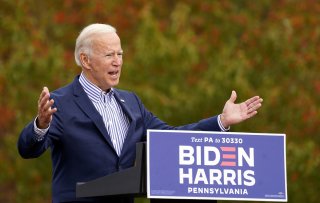The Truth About Bidencare
Would Bidencare actually work or represent a fresh health care disaster?
With the Affordable Care Act (ACA), or Obamacare, on the chopping block after the Senate surely approves Trump’s third Supreme Court nomination Amy Coney Barrett on Monday, former vice-president Joe Biden said this past Thursday night that he would build in essence create an even bigger health care plan. Indeed, Biden did not mince his words: "What I’m going to do is pass Obamacare with a public option, it becomes Bidencare.”
What is Bidencare—and would it actually work? Or would it lead to a fresh health care disaster?
Bidencare, Explained:
Just days after November 3, the Supreme Court will decide the fate of Obamacare in a case centering on led by red states, as well as the Trump administration, to abolish it once and for all by arguing that without a tax mandate, which Congress eliminated in 2017, it’s unconstitutional. Trump and congressional Republicans have attempted to strike down ACA in the past, but failed as Chief Justice John Roberts saved the law in 2012 by calling it a tax. “It’s in court because Obamacare is no good,” President Trump said at the final presidential debate. “No matter how well you run it, it’s no good. What we’d like to do is terminate it.”
In the event that ACA is repealed, a Biden administration would “build on the Affordable Care Act by giving Americans more choice, reducing health care costs and making our health care system less complex to navigate,” according to Biden’s own campaign website. The plan offers a public option -- which will spike competition among private insurers -- that individuals could opt-into instead of purchasing private insurance externally or through an employer. It also expands coverage and reduces premiums primarily for middle-class families, as they would receive a premium tax credit to aid health coverage and ultimately reduce overall annual health care spending per family.
The agenda would also automatically enroll low-income Americans in the public option and works to provide aid for long-term care, rural health and mental health practices.
Another part of Bidencare offers premium-free access to the public health insurance option for those that are eligible for Medicaid in states that have opted-out of the program.
Although Bidencare offers an automatic public option, there are some holes in the former vice-president’s agenda that have left health care policy experts skeptical.
“The public option really doesn’t work in a sense of attracting customers, unless it's better than the other options that are available,” Joseph Antos, the Wilson H. Taylor Resident Scholar in Health Care and Retirement Policy at the American Enterprise Institute (AEI), said, referring to private or commercial insurance options provided by an employer. “That requires some combination of better benefits somehow… lower premiums, lower cost-sharing, broader network -- some combination of those ingredients would sell a new insurance plan.”
“But the real way to get this thing to work is to get the cost down because you can’t expand benefits unless you’re saving money somewhere else or unless you’re getting a much larger subsidy than the other plans of the exchanges, and I don’t think Biden could pull that off,” Antos added.
The more people who opt into the public option and leave the employer plan, the higher the premiums will be for those who still remain under the private employer-related option.
Antos also noted that Biden would receive massive pushback from medical professionals, as hospitals and doctors would be legally forced to accept the cheaper public option that provides a large service discount to those opted-into the public option. He expects that medical organizations would “quietly lobby against him,” as doctors would provide care for a fraction of the price compared to those under private insurance plans.
Other health care experts have questioned the feasibility of Bidencare, as “there are downstream execution complications with this sketchy design,” according to Thomas Miller, a resident fellow at AEI.
“What happens to the employer mandate? To what is considered “affordable coverage” under ESI [Employer Sponsored Insurance]? Do non-expansion states have to pay anything for their low-income adults enrolled in the public option,” Miller said.
Can It Work?:
Biden’s plan is expected to extend health care coverage to an additional 15 to 20 million people and cost an estimated $850 billion over the next decade, according to the Committee for a Responsible Federal Budget.
But to pay for these policy changes like reducing spending on prescription drugs and stopping “surprise billing,” Biden proposes that he’ll boost taxes on high-income households and revenue feedback from expanding coverage.
Under a Biden administration, however, both Antos and Miller said that the more progressive wing of the Democratic party -- who back Medicare For All -- will likely push for more health care coverage, as Bidencare “doesn’t go far enough,” Antos said, in terms of covering low-income and middle-class individuals.
The former vice-president has clearly split from Democratic lawmakers including Sens. Kamala Harris (D-Calif.) and Bernie Sanders (I-Vt.) who support the far-left Medicare For All measure and sided with a more moderate approach to health care. But even with these proposals presented, the experts doubt that a full-blown health care policy change will happen amid a pandemic that’s swallowed any unrelated legislation.
“And, just how much time, space, attention, and debt-fueled resources remains for further health policy disruption, in year one of a Biden presidency while still facing the remaining impact of a pandemic, a deep economic recession, a polarized electorate, an overcrowded (and underpowered) legislative calendar, a still-polarized electorate, and some nostalgic hopes of a partial return to what used to be considered ‘normalcy?’” Miller said. For Democrats, who recall the political imbroglio that Obamacare landed them in, a Biden push on health care might start to look like déjà vu all over again.
Rachel Bucchino is a reporter at the National Interest. Her work has appeared in The Washington Post, U.S. News & World Report and The Hill.
Image: U.S. Democratic presidential candidate Joe Biden speaks during a drive-in campaign event at Bucks County Community College in Bristol, Pennsylvania, U.S., October 24, 2020. REUTERS/Kevin Lamarque.


